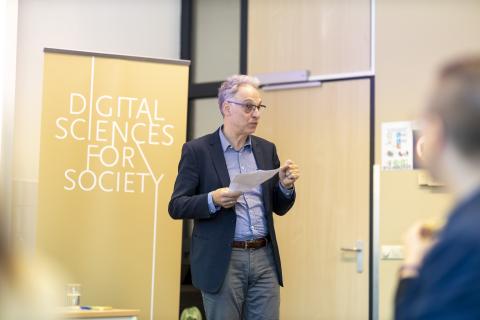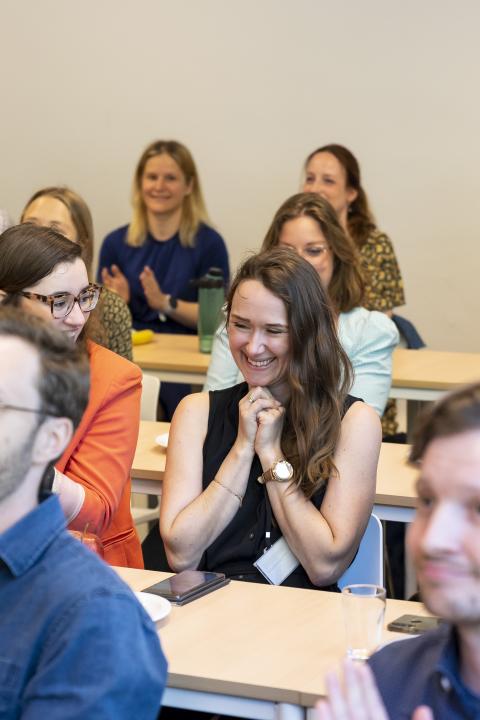Tilburg University invests in Digital Sciences for Society: first € 240,000 awarded to 14 Growth Projects
Tilburg University has awarded funding to 14 research projects for their potential to help society move forward by applying, reflecting on, or further developing digital sciences. By awarding this funding, the Digital Sciences for Society program encourages research with impact. And through the program, the university also aims to strengthen its unique expertise on the interface of digital sciences, social sciences, and humanities.
Each one of the projects that have been awarded funding is multidisciplinary: several Schools are involved as well as at least one external partner. Lots have been drawn to allocate the available funds to the selected projects.
Academic lead Boudewijn Haverkort: “I am thrilled by the proposals, not only because of their number, but also and especially because of the collaboration between researchers from various Schools they generate and the energy that has gone into preparing them. A huge diversity of socially relevant topics has been targeted and many external partners have been engaged. We have opted for allocating funds by lot, because it is not subjective and does not make a value judgement, which consequently does not adversely intensify competition. It also reduces the burden of reviewing the proposals. The 27 selected projects have been vetted by the Vice-Deans for Research to ensure they meet certain quality and al requirements.”


In the Digital Sciences for Society program, the funded projects are termed Growth Projects. These are small-scale projects (budgeted at EUR 15,000-40,000) that offer an opportunity to researchers to develop partnerships and to explore ways of using digital sciences to contribute to socially relevant research. In early July, funding will also be awarded to so-termed Icon Projects. These projects run for three to five years and are undertaken by large consortia of Schools and external partners. Each one of such projects is budgeted at around EUR 1 million max.
The Digital Sciences for Society program has three focus areas: research with impact, education, and organizing collaboration. Through this program, the university invests more than EUR 7 million in initiatives that contribute to expanding knowledge about digital sciences among lecturers and students, developing digital sciences as a scientific area, and using digital sciences for innovations that benefit society. There will also be room for critical and ethical reflection on the potential downside of digital technology.
We congratulate the following research teams on having been awarded funding:
|
Project |
Research team |
| Tackling the impersonality of algorithmic management: community-building strategies and social well-being on online labor platforms |
Applicants: Tim Christiaens (TSHD), Ivana Vranjes (TSB), Francesca Ciulli (TSB) Collaborative partners: Nederlandse Stichting voor Psychotechniek (NSvP), European Trade Union Institute (ETUI), Nederlandse Organisatie voor Toegepast Natuurwetenschappelijk Onderzoek (TNO), Mijke Houwerzijl (TLS) |
| An Interdisciplinary Analysis of gender-based discrimination in Translation Technology |
Applicants: Eva Vanmassenhove (TSHD), Seunghyun Song (TSHD), Hanna Lukkari (TLS) Collaborative partners: Google, Transgender Netwerk Nederland (TNN) |
| Digital Dignity Initiative |
Applicants: Anuj Puri (TLS), Frans Cruijssen (TiSEM) Collaborative partner: the association of Dutch foodbanks |
| Virtual Virtuosity: Building Character Through Practical Wisdom in a Digital World |
Applicants: Krijn Pansters (TST), Arnoud-Jan Bijsterveld (TSB), Tessa Leesen (University College Tilburg) Collaborative partners: various religious communities, Tilburg Center of the Learning Sciences (TiCeLS), FSC, Franciscan Capuchin Collection (Tilburg University Library), st. Verhalis |
| Mobile Cognitive Assessment for all Ages – Development of the Cognition App CogniA |
Applicants: Alexandra Hering (TSB), Nicola Ballhausen (TSB), Elisabeth Huis in ’t Veld (TSHD), Judita Rudokaité (TSHD), Tjaša Petročnik (TLS) Collaborative partner: Sanquin |
| Filtering Reality |
Applicants: Anne-Mette Hermans (TSB), Ini Vanwesenbeeck (TSHD), Marjolein de Boer (TSHD), Emmelyn Croes (TSHD), Jolanda Veldhuis (VU), Sophie Boerman (WUR) Collaborative partner: Media Wegwijs |
| ChatGPT and Beyond: A new way to technological innovation |
Applicants: Yik Kiu Leung (JADS), Christine Yin Man Fong (TSB) Collaborative partners: Ksenia Podoynitsyna (TU/e), Datacation |
| NAIL: Nail based Artificial Intelligence image Learning for measuring iron status |
Applicants: Judita Rudokaité (TSHD), Elisabeth Huis in ’t Veld (TSHD), Nicola Ballhausen (TSB), Alexandra Hering (TSB), Sharon Ong (TSHD), Tjaša Petročnik (TLS), Mart Janssen (Sanquin) Collaborative partner: Sanquin |
| Mobiele eye-tracking technologie voor onderzoek naar dagelijkse sociale interacties: Met toepassingen in ouder-kind en arts-patiënt interacties |
Applicants: Debby Damen (TSHD), Gijs Holleman (TSB), Rabia Chhangur (TSB), Rein Cozijn (TSHD), Nadine Bol (TSHD), Carla Roos (TSHD) Collaborative partner: ETZ hospital |
| Pint = Pitch and Intensity Test |
Applicants: M. Paula Roncaglia-Denissen (TSHD), Tineke M. Snijders (TSB) Collaborative partners: Vrije Universiteit Brussel (Department of Educational Sciences), Fontys Academy of Music and Performing Arts |
| Artificial Intelligence Technology Implementation into the Daily Workflow in Care Organizations: The Role of Human Resource Management |
Applicants: Frederike Scholz (TSB), Tina Sahakian (TSB), Ton Wilthagen (TLS), Colette Cuijpers (TLS), Chris van der Lee (TSHD), Steven Jellinghaus (TLS) Collaborative partners: Jeroen Bosch hospital (JBZ), Fontys Paramedische Hogeschool |
| Employees usage of ChatGPT at work: A job crafting perspective |
Applicants: Christine Yin Man Fong (TSB), Yik Kiu Leung (JADS), Dorien Kooij (TSB) Collaborative partner: Vattenfall |
| Investigating mind-wandering |
Applicants: Andrew Reid (TSB), Myrthe Faber (TSHD) Collaborative partners: MindLabs, Veilig Verkeer Nederland (VVN) |
| Smell-e Technology: Validating immersive multisensory VR food environments to study food choice |
Applicants: Rachelle de Vries (TSHD), Nynke van der Laan (TSHD), Tessa van Leeuwen (TSHD), Matti Vuorre (TSB) Collaborative partners: CyNexo, Wageningen University & Research |
Keep an eye out for project details and updates on the Digital Sciences for Society website.
Get ready for the digital future
The Digital Sciences for Society program invests in impactful research, education and collaboration aimed at seizing the opportunities and dealing with the challenges of digitalization for science and society.

